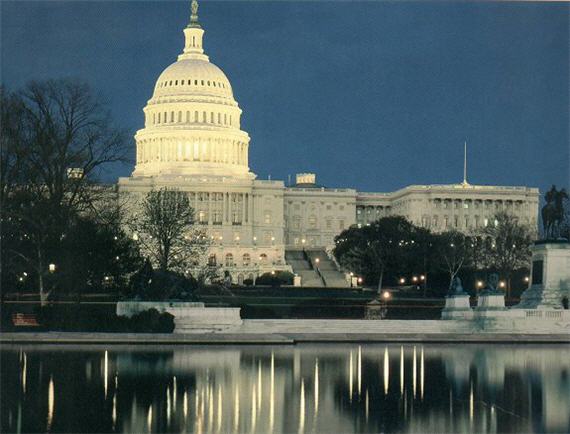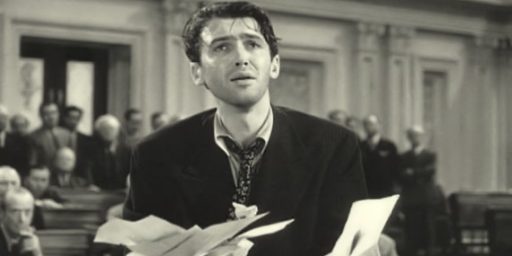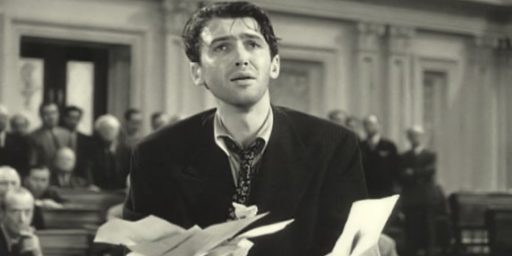Filibuster Reform
Under what conditions might we see filibuster reform?

The Hill reports: Senate Democrats not backing down on push for filibuster reform
In the wake of two failed procedural votes last week, some Democrats in the upper chamber say reform is necessary. However, obstacles remain in the form of Democratic centrists and election-year politics.
[…]
Many Democrats say the votes make it more, not less, likely that they will pursue filibuster reform in January, after the new Senate has been seated.
My initial reaction upon reading the headline was “a little late now, fellas” given that the Democrats will have a substantially diminished majority (if not minority status) in the Senate in January.
My second thought, however, is that if there is a truly serious reform-minded bloc of Democrats on this subject that the only way that they are likely to generate movement on the topic is from within the minority. I very much think that filibuster reform is a good idea, but it is the kind of idea that the majority is unlikely to be able to pull off, as the minority will, oddly enough, filibuster it. Even a party with 60 votes will find it difficult to pull off because of political accusations of abuse of power. However, if a serious number of Senators in the minority take on reform from a principled point of view, and join up with a majority (which has power motivations to curtail minority powers), then reform could be accomplished.
Ultimately, only Nixon can go to China and perhaps only the minority can originate filibuster reform.
Regardless of what one thinks about a given bill, it is problematic that legislation can be blocked when it has 59 votes out of 100. It is even worse that it can be killed via a procedural vote of that nature.
Something needs to be done about holds (especially secret ones) as well, although most Senators want to retain that power. There is no justification for giving one Senator the power to obstruct a nomination, or to put a hold on a bill.






It would seem to me that it would have to take about thirty on the Left and thirty on the right to get reform. Is that make it an immoderate proposal?
In other words, the most conservative (James Inhofe) and the most liberal (Sherrod Brown) gain the least from having to aquire votes to defeat a filibuster.
I continue to be against reforming the filibuster; I thought it was a terrible idea when Frist proposed it to help us, I think it’s a terrible idea now Reid is proposing it to help them, and I think the CDP will remember how much they agree with me in, oh, about five weeks. Even if we can’t reverse the slow decline of the Senate into a clone of the House, which started with the Seventeenth Amendment, we don’t have to accelerate it, which is the ultimate goal of filibuster reform whether its proponents admit it or not.
I’m inclined to agree with Steven that reform of so-called “holds” is something that ought to be done, and on which there is consensus outside Senate perquisitism. There’s much to say for the submajority veto, but holds are maladaptive to the extent that they encourage Senators to hold their support to ransom.
We will see filibuster reform when the Sun rises in the West, the Bush family stops uttering malapropisms, and the Detroit Lions win the Super Bowl.
My apologies in advance if this has been well-tread, as I arrived here via Memeorandum, but can you point me to historical posts that you’ve made talking about your desire for filibuster reform while GWB was in office?
Perhaps an agreement can be struck that reduces the votes required for cloture gradually over a set period of time, let’s say 5 to 10 years. No one loses immediately yet the problem gets solved.
Steve Plunk, I thought you were going a different direction with time. I want to see bills published for public scrutiny and debated and analyzed. Politicians want to debate the subject matter and work out the details in the backroom and announce the actual language at the time of the vote.
The longer a bill is pending, the lower the cloture vote requirement should be.
So in your opinion 59% or less should be able to force 41% to do what the larger number wants? Sounds to me like a formula for civil war.
PD, I’m not sure what the answer is. Filibusters have good points and bad points but either way they are not part of the Constitution but merely Senate rules.
Seems to me the best way for it to happen is for it not to take effect until the results of a future, unknown election take place. It’s sort of like how Republicans and Democrats both agreed to get rid of the Independent Counsel because neither knew who was going to win in 2000. I think right now the chances of a Democratic Majority are strong enough that the likely Republican minority wouldn’t sign on. However, if they get within a seat or two, I could see them making the change to take effect in 2012 when nobody knows who will control the senate.